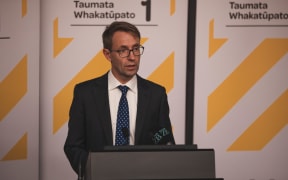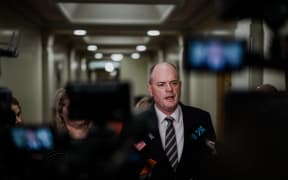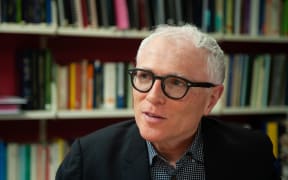Analysis - There is plenty of blame being passed around over the failure to test a large group released early from managed isolation for Covid-19, but the public is no nearer to finding out how or why it happened.

The Navy has been posted outside a Novotel being used as a managed isolation facility in Auckland. Photo: RNZ / Chen Liu
After more than a week, officials have confirmed 51 people out of 54 were allowed to leave before their fortnight was up on compassionate grounds - between 9 and 16 June - without being tested.
Thirty-nine have returned negative results and some are awaiting results.
The ministry is still trying to test four people, with the police being brought in to track one of them down.
When New Zealand moved into level one on 8 June, border controls were tightened - tests at day three and day 12 were to be mandatory and a negative test required before leaving.
A week later the government suspended compassionate leave in response to the case of the two women who tested positive after leaving managed isolation early, that by then was a pre-requisite.
A broader group is being tracked down and tested as a precaution, who left managed isolation after the new testing rules were imposed, up until the date the two women tested positive.
They were all supposed to be tested, but Prime Minister Jacinda Ardern revealed in Parliament that only happened for about half of them, or 1249.
But she said other protocols had been followed, including medical checks and 14 days in isolation.
See all RNZ coverage of Covid-19
Health Minister David Clark said the testing regime did not meet his expectations.
"It's not what I expected to happen, there were some very clear protocols of course in the way in which they interacted with family members when out on that compassionate ... but I'm not happy with how the system operated, I've made that clear."
But he repeatedly deferred to Director-General of Health Dr Ashley Bloomfield when pressed on how exactly it happened.
"The director-general has been very clear that the system did not do what it said it was going to do, he's taken ownership of that and set about fixing it."
Another question was - how this happened in the first place?
"What has clearly happened is that it hasn't been delivered as ministers reasonably expected it would be delivered," Clark told reporters.
Based on comments by public health experts National is running the line there could yet be community transmission.
National's Michael Woodhouse said that was worrying and probably due to the "poor management" of isolation facilities. He said it should become clear in the next week or so whether it had spread any further.
The government has pushed back on that saying the thousands of tests - including record numbers yesterday - would have identified Covid-19 if it was circulating in the community.
Ardern also told the House ministers had actively sought and received assurances from officials testing would be happening as the new rules required.
"At one point we did directly query the fact that our testing numbers were declining ... our office [sought] information of testing at at-risk places, that prompted the ministry to reconfirm to my office on the 5th of June that daily testing was occurring on day three and day 12 of those at the border, including everyone at facilities starting from the 8th of June."
National's Michael Woodhouse still maintains the Health Minister David Clark should be sacked.
"Look we're way past that ... he's a dead man walking now."
His leader Todd Muller has also defended his comments about the possibility of community transmission, after views aired by some public health experts.
"When you've got over 2000 people that are out in the community that the government haven't tested when they said they were going to test and the health specialists are now saying themselves that that is a great risk that the disease has been reseeded in the community, and I think that's a very fair reflection to have," Muller told reporters.
He said the opinions of experts were a "complete indictment" of how the government had handled border controls.
Read more about the Covid-19 coronavirus:
- See all RNZ Covid-19 news
- Covid-19 symptoms: What they are and how they make you feel
- Touching your Face: Why do we do it and how to stop
- Scientific hand-washing advice to avoid infection
- Your Covid-19 questions answered - from health and employment to managing anxiety
- A timeline: How the coronavirus started, spread and stalled life in New Zealand
- Coronavirus: A glossary of terms






